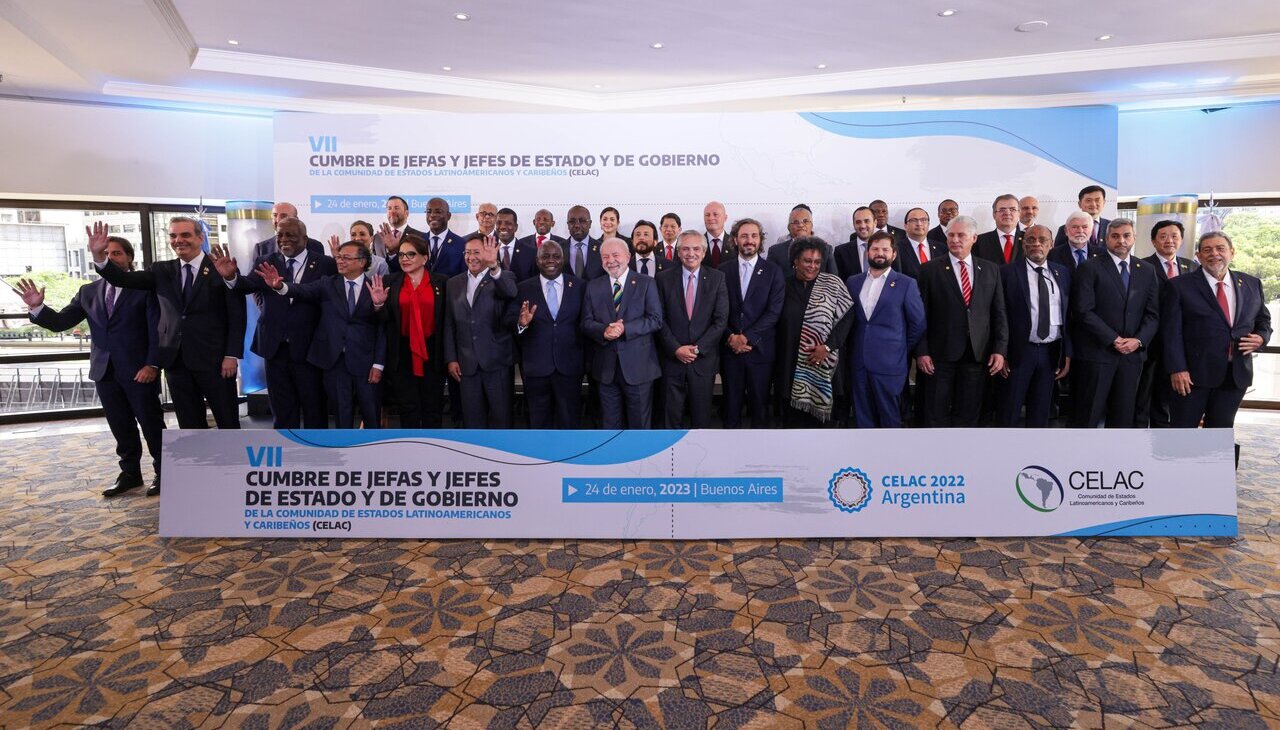
CELAC closes summit betting on regional integration
The organization wants to advance an agenda in spite of differences.
The seventh Summit of the Community of Latin America and Caribbean States (CELAC) recently ended on Tuesday, Jan. 24 in Buenos Aires, Argentina. Of the many issues discussed included: Requesting the end of the economic blockade against Cuba, showing support for the start of dialogues in Venezuela, and applauding the integration process amid a push for more diversity.
“With dialogue, freedom and dignity we advance in the well-being of our peoples. In this Celac Summit we address common responses for migration, security, and the protection of democracy,” said President of Chile, Gabriel Boric, in his speech.
The seventh edition
The summit, which concluded with the creation of a document of 100 points and 11 special declarations, highlighted the objectives of Latin America and the Caribbean. It also showed the world that the nations are fully aware of their projection and have the capacity to delve into the issues that seek a common consensus.
However, the meeting was not without controversy with the involvement of right-wing opposition leaders who condemned the presence of countries involved in investigations for human rights violations and anti-Democratic practices, such as Cuba, Nicaragua and Venezuela.
Presidents Daniel Ortega and Nicolás Maduro were also absent despite the support of the Argentina's president and other leaders of the region who defended their presence at the summit. It also promoted the message of "advancing with determination in the integration process, promoting unity and political, economic, social and cultural diversity,” while welcoming the support of the international community for dialogues in those nations.
Maduro, who cited security reasons, sent a recorded message in which he indicated that his absence was due to "calculated provocations and ambushes."
CELAC also supported dialogue and negotiation between the Government of Venezuela and the opposition Unitary Platform of Venezuela, promoted by the Governments of Mexico and Norway.
One of the high notes of the summit was the return of Brazilian President Luiz Inácio Lula da Silva after a two-year absence.
| Cierre de la sesión plenaria de la VII Cumbre de Jefas y Jefes de Estado y de Gobierno de la CELAC.
— Comunidad de Estados Latinoamericanos y Caribeños (@PPT_CELAC) January 24, 2023
https://t.co/F3jDpM9m3T
https://t.co/5Iq7I7OaVa
https://t.co/MKbfc7WrLx
https://t.co/pJtArv5hny#CELACArgentina2022 pic.twitter.com/cEAKw6W81P
Pending challenges
Two of the most critical issues for Latin America and the Caribbean are the fight against drugs and climate change. During the meeting, there was a request for more effective international cooperation to deal with the global problem of drug trafficking, respecting the laws of each country and finding alternatives beyond direct warfare.
RELATED CONTENT
The member states also sent an urgent message for developed countries to fulfill their commitment to deliver $1 billion per year, between 2020 and 2025, to finance the climate fight and disaster prevention in the region.
There were also discussions around creating a singular currency in the region and the construction of a railway connecting all countries of Latin America, but little progress was made on that front.
Taking advantage of the meeting, several of the leaders also pointed out the need to continue advocating for respect for democracy and human rights, referring to the political situation in Venezuela and Nicaragua, as well as the far-right attacks in recent days in Brazil.
“United, we can have overwhelming force. To achieve this, all of Latin America and the Caribbean must be integrated into a single region that defends the same interests for the growth of our peoples," said Argentina President Alberto Fernández.
After closing in Buenos Aires, the next summit will take place in Saint Vincent and the Grenadines, the country chosen to assume the Pro Tempore Presidency of CELAC.
A message to the United Nations
CELAC also called on the United Nations General Assembly to put an end to the economic, commercial and financial blockade against Cuba, while expressing its rejection of unilateral lists and certifications that hit countries of the region in certain ways.
The UN was also asked to remove Cuba from the unilateral list of countries that allegedly sponsor international terrorism.











LEAVE A COMMENT: